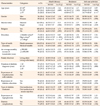2. Won AL, Yoo SH, You MS. Factors related to perceived health status in patients with type 2 diabetes. Korean J Health Educ Promot. 2014; 31(3):1–13. DOI:
10.14367/kjhep.2014.31.3.1.

3. Yoo JH. A study on the relationship of self care behavioral compliance and perceived self-efficacy in type II diabetic patient. J Korean Acad Fundam Nurs. 2000; 7(3):453–465.
4. Mcdowell J, Courtney M, Edwards H, Shortridge-Baggett L. Validation of the Australian/English version of the diabetes management self-efficacy scale. Int J Nurs Pract. 2005; 11(4):177–184. DOI:
10.1111/j.1440-172X.2005.00518.x.

5. American Diabetes Association. Standards of medical care in diabetes-2009. Diabetes Care. 2009; 32:Supplement 1. S13–S61. DOI:
10.2337/dc09-S013.
6. Nutbeam D. The WHO health promotion glossary. Health Promot Int. 1998; 1:1–36.
7. Davis TC, Wolf MS, Bass PF, Middlebrooks M, Kennen E, Baker DW, et al. Low literacy impairs comprehension of prescription drug warning labels. J Gen Intern Med. 2006; 21(8):847–851. DOI:
10.1111/j.1525-1497.2006.00529.x.

8. Kim JE. Measuring the level of health literacy influence factors: targeting the visitors of a university hospital's outpatient clinic. J Korean Clin Nurs Res. 2011; 17(1):27–34.
9. Lee TW, Kang SJ. Health literacy in the Korean elderly and influencing factors. J Korean Gerontol Soc. 2008; 28(4):847–863.
10. Lee YM, Son YJ, Lee EJ. Health literacy, disease-related knowledge, self-efficacy and self-care behavior in patients with diabetes mellitus. J Korean Data Anal Soc. 2012; 14(6):3087–3101.
11. Kim HJ. Effects of group arts therapy on the resilience with older women of resident. Korean J Arts Ther. 2014; 4(1):255–275.
12. Pack MJ. A study of a resilience enhancing model to prevent depression in the elderly [dissertation]. Busan: Pusan National University;2006.
13. Yi-Frazier JP, Yaptangco M, Semana S, Buscaino E, Thompson V, Cochrane K, et al. The association of personal resilience with stress, coping, and diabetes outcomes in adolescents with type 1 diabetes: variable-and person-focused approaches. J Health Psychol. 2015; 20(9):1196–1206. DOI:
10.1177/1359105313509846.
14. Keum HS, Suh SR. HbA1c, self-efficacy and self-care activities depending on the disease duration of type 2 diabetes mellitus patients. J Korea Contents Assoc. 2014; 14(12):303–312.
15. Park SY, Oh PJ. Factors influencing diabetes educational needs in patients with diabetes mellitus. J Korea Acad Ind Coop Soc. 2014; 15(7):4301–4309. DOI:
10.5762/KAIS.2014.15.7.4301.

16. Loeb SJ, Steffensmeier D, Kassab C. Predictors of self-efficacy and self-rated health for older male inmates. J Adv Nurs. 2011; 67(4):811–820. DOI:
10.1111/j.1365-2648.2010.05542.x.

17. Fraser E, Pakenham KI. Resilience in children of parents with mental illness: relations between mental health literacy, social connectedness and coping, and both adjustment and caregiving. Psychol Health Med. 2009; 14(5):573–584. DOI:
10.1080/13548500903193820.

18. Davis TC, Long SW, Jackson RH, Mayeauk EJ, George RB, Murphy PW, et al. Rapid estimate of adult literacy in medicine: a shortened screening instrument. Fam Med. 1993; 25(6):391–395.
19. Lee SH, Choi EHR, Je MJ, Han HS, Pack BK, Kim SS. Comparison of two versions of KHLAT for improvement strategies. Korean J Health Educ Promot. 2011; 28(3):57–65.
20. Connor KM, Davidson JRT. Development of a new resilience scale: the Connor-Davidson Resilience Scale (CD-RISC). Depress Anxiety. 2003; 18(2):76–82. DOI:
10.1002/da.10113.

21. Toobert DJ, Glasgow RE. Assessing diabetes self-management: the summary of diabetes self-care activities questionnaire. In : Bradley C, editor. Handbook of psychology and diabetes. The Netherlands: Harwood Academic;1994. p. 351–375.
22. Toobert DJ, Hampson SE, Glasgow RE. The summary of diabetes self-care activities measure: results from 7 studies and a revised scale. Diabetes Care. 2000; 23(7):943–950. DOI:
10.2337/diacare.23.7.943.

23. Chang S, Song M. The validity and reliability of a Korean version of the summary of diabetes self-care activities questionnaire for older patients with type 2 diabetes. J Korean Acad Adult Nurs. 2009; 21(2):235–244.
24. Baron RM, Kenny DA. The moderator-mediator variable distinction in social psychological research: conceptual, strategic, and statistical considerations. J Pers Soc Psychol. 1986; 51(6):1173–1182.

25. Barbarba HM, William F, Chestnut H. Statistical methods for health care research. 5th ed. Philadelphia: Lippincott Willams & Wilkins;2005. p. 290–300.
26. Hong IH, Eun Y. Health literacy of inpatients at general hospital. Korean J Adult Nurs. 2012; 24(5):477–488. DOI:
10.7475/kjan.2012.24.5.477.

27. Kim JI, Byeon YS. A study on the factors affecting resilience in patients with colon cancer. Asian Oncol Nurs. 2013; 13(4):256–264. DOI:
10.5388/aon.2013.13.4.256.

28. Al-Maskari F, El-Sadig M, Al-Kaabi JM, Afandi B, Nagelkerke N, Yeatts KB. Knowledge, attitude and practices of diabetic patients in the United Arab Emirates. PLoS ONE. 2013; 8(1):1–8. DOI:
10.1371/journal.pone.0052857.

29. Cheon MY, Kang J. The mediating effect of the resilience on the relationship between Type D personality and compliance in patients with coronary artery disease. Korean J Adult Nurs. 2016; 28(1):61–70. DOI:
10.7475/kjan.2016.28.1.61.

30. McCleary JV. Health literacy and its association with diabetes knowledge, self-efficacy and disease self-management among African Americans with diabetes mellitus. ABNF J. 2011; 22(2):25–32.




 PDF
PDF ePub
ePub Citation
Citation Print
Print







 XML Download
XML Download